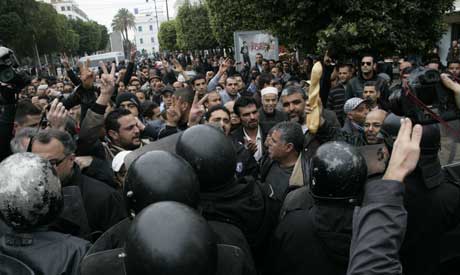
Clashes continue in the streets of the Tunisian capital, denouncing the new “unity” government that includes many figures from the ousted Ben Ali regime.
The revolution in Tunesia is not over yet, as the above picture shows. In the west we only tuned in when it hit the climax and we’re already starting to tune out again now that the situation has been declared to be resolved. Ben Ali has been made into a scapegoat, with his erstwhile supporters and collaborators attempting to keep their own power and skins through this government of national unity, while placating the protesters with gestures like the release of political prisoners. These are steps in the right direction, but the fundamental problems of the country are not resolved by them. The same people who oppressed it are still largely in power, still think that they can calm down the protests with small concessions, that once things have calmed down they can go back to dividing the country’s wealth amongst themselves. The protestors know this and hence stay out on the streets, unwilling for now to be placated this way.
Meanwhile French capital sees the fall of Ben Ali as an opportunity to penetrate Tunesia further, as also reported in Ahram Online. But for that to be the case, the revolution and protests need to end soon. some sort of compromise, like this national government between the old regime and its opposition needs to be reached. In situations like this, when the common enemy, Ben Ali, has been vanquished, but the structures of the old regime are still in place and able to act to defend themselves, is when revolutions get derailed, as inherent class differences come to the fore.
The protests didn’t just call for greater political freedoms after all, but also more basic economic freedoms. What’s on offer now from the old regime is greater political freedom, a somewhat more representative government and a place at the table for the old elite and middle class opposition to Ben Ali and his party, the the Rassemblement constitutionnel démocratique (RCD). And with the chief kleptocrat gone, there are also economic spoils to be had for those opposition leaders willing to help shore up the old elite. And at the same time there’s foreign pressure, from France as Tunesia’s largest trading partner, but also from other “western democraties” to get the unrest dealt with quickly and get things back to normal.
Which leaves the ordinary men and women of Tunesia out in the cold, their economic and political grievances so far unheard. How they will respond to these attempts to freeze the revolt is uncertain. It’s likely that their answer will be largely determined by class: the petit bourgeoisie, small shop owners, traders and the like, will likely want the unrest to end sooner rather than later, even if this largely means a return to the status quo, just sans Ben Ali. For the working classes and working poor, this return will be more difficult and much less desirable. The protests got started when Mohamed Bouazizi set himself on fire. He had been unable to find meaningful employment, resorted to selling fruits and vegetables on the street in Sidi Bouzid to support himself and his family and then the police took his fruit cart from him, denying him his last means of existence. That was enough for him to set himself alight and that was the spark (no pun intented) that started the revolution. For people like Bouazizi anything that allows the RCP to remain in government, that doesn’t stop the cronyism and the plundering of the nation’s economy by the political elites, is a defeat. That’s why the protests continue: they need to win to survive or face the same slow death again, only with a slightly nicer government in power.